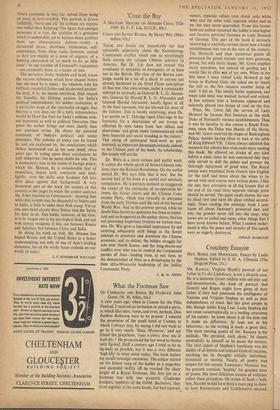'Crost the Bay
THESE two books are remarkable for that admirable objectivity about the Kuomintang- Communist conflict which one so surprisingly finds among the refugee Chinese scholars in America. But Dr. Liu does not extend this avoidance of prejudice to foreigners, or at least not to the British. His view of the Burma cam- paign would be a bit of a shock to anyone not already hardened to the Errol Flynn conception of that war. Our own armies, under a commander referred to variously as General R. L. G. Alexan- der, General Sir Harold R. L. G. Alexander and General Harold Alexander, hardly figure at all in the final successes, but are blamed for most of the failures. This is hardly surprising, since Dr. Liu quotes an F. Eldridge (spelt Elderidge in the footnote) for a description of our troops as officered by men taken from 'law offices and plantations' and given ranks 'commensurate with their financial and social standing in the colony.' This citing of ephemeral hack-work as por- tentously as important documents extends, indeed, to the Chinese part of the book. As scholarship, this simply will not do.
Dr. Wei's is a more serious and useful work. It covers the whole epoch of Soviet-Chinese rela- tions since the Russian Revolution. On the earlier period Dr.- Wei says little that is new. But the second half of his book is a useful and scholarly compilation. He is perhaps inclined to exaggerate the extent of, the continuity of co-operation be- tween the Soviet rulers and the Chinese Com- munist Party, which was virtually in abeyance from the early Thirties until the end of the Second World. War. And in the postwar period, while no doubt. Sino-Soviet co-operation has been as impor- tant and as dangerous as the author shows, this has not prevented important rivalries on various mat- ters. Dr. Wei .gives a lop-sided impression by not covering adequately such things as the Soviet attempt to penetrate and dominate the Chinese economy, and its defeat; the hidden struggle for rule over North Korea; and the long-drawn-out conflict over who was to control the Communist parties of Asia—leading even, at one time, to the denunciation of Mao as a deviationist by the then ultra-Muscovite leadership of the Indian Communist Party.
J. Ii M. ARDEN


































 Previous page
Previous page